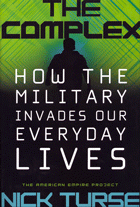[Note for TomDispatch Readers: Consider today’s striking post by John Feffer a reminder that you really should pick up his remarkable new dystopian novel, Splinterlands, which is also the latest Dispatch Book. As Barbara Ehrenreich has pointed out, Feffer's tale from the year 2050 “paints a startling portrait of a post-apocalyptic tomorrow that is fast becoming a reality today.” (And keep in mind that she wrote that before Donald Trump became president!) When you buy the book, you’ll not only get a great, if chilling, read, but also give a bit of much-appreciated extra support to this website. Or, if you’re in a generous mood, for a $100 donation ($125 if you live outside the USA), you can get a signed, personalized copy of Splinterlands from the author. Check out our donation page for the details. Tom]
“More than 25 years ago, as I sat on the roof of our house watching the neighborhood’s furniture float down the street, I thought things couldn’t get any worse. Everything I owned was under water. The capital of my country was ruined. Mother Earth was exacting its revenge upon its most arrogant inhabitants. As it turned out, things got a lot worse.”
I’m sure, like the rest of us, you haven’t forgotten that disastrous event either, that moment in 2022 when a climate-charged Hurricane Donald tore through Washington leveling the city, and our nation’s capital was subsequently moved to Kansas. While no one could have predicted such an event in all its details, there were few firsthand observers of that rampaging super-storm who had foreseen the fragmented, degraded world we now inhabit in a more clear-eyed manner than Julian West (the observer quoted above) whose 2020 bestseller Splinterlands eerily foresaw this present shattered globe of ours.
Okay, okay, here’s where I fess up: it’s true that geo-paleontologist Julian West (a namesake for the hero of Edward Bellamy’s nineteenth century utopian novel, Looking Backward) is just a fantasy stand-in for John Feffer, the author of the actual dystopian novel Splinterlands. And if that isn’t complicated enough for you, keep in mind that Feffer named that hurricane after Donald Trump while he was still writing his book back in 2016 just as the election campaign was gearing up, so he certainly does have a Julian West-style sense of what’s to come. Now, of course, Hurricane Donald has hit Washington in a tweet-charged storm of chaos and dystopian energy. And so today, Feffer turns his attention to what to make of that human hurricane at a moment when Americans are signaling their dystopian fears by driving novels like 1984 to the tops of bestseller lists -- and not just in bastions of anti-Trumpist feeling either. So strap your jet pack to your back and take off with Feffer into a present that feels all too much like some dystopian future to all too many of us. Tom
Doubling Down on Dystopia
Preventing the Triumph of Trump’s Will
By John FefferDystopias have recently achieved full-spectrum dominance. Kids are drawn to such stories -- The Giver, Hunger Games -- like Goths to piercings. TV shows about zombie apocalypses, pandemics, and technology run amok inspire binge watching. We’ve seen the world-gone-truly-bad a thousand times over on the big screen.
This apocalyptic outpouring has been so intense that talk of “peak dystopia” started to circulate several years ago. Yet the stock of the doomsday cartel has shown no signs of falling, even as production continues at full blast. (A confession: with my recent novel Splinterlands I’ve contributed my own bit to flooding the dystopia market.) As novelist Junot Diaz argued last October, dystopia has become “the default narrative of the generation.”
Shortly after Diaz made that comment, dystopia became the default narrative for American politics as well when Donald Trump stepped off the set of The Celebrity Apprentice and into the Oval Office. With the election of an uber-narcissist incapable of distinguishing between fact and fantasy, all the dystopian nightmares that had gathered like storm clouds on the horizon -- nuclear war, climate change, a clash of civilizations -- suddenly moved overhead. Cue the rumble of thunder and the flash of lightning.
Every now and then, I think back to the millions of people who turned out in this country and across the globe in early 2003 to protest the coming invasion of Iraq. Until the recent Women’s March against Donald Trump, that may have been the largest set of demonstrations in American history or, at the very least, the largest against a war that had yet to be launched. Those who participated will remember that the protests were also a sea of homemade signs, some sardonic (“Remember when presidents were smart and bombs were dumb?"), some blunt (“Contain Saddam -- and Bush”), some pointed indeed (“Pre-emptive war is terrorism"). In one of those demonstrations, I was carrying a sign which read “The Bush administration is a material breach” (a reference to that crew’s insistence that Saddam Hussein’s Iraq was in “material breach” of a U.N. resolution for not fully disclosing its efforts to produce weapons of mass destruction... you know, those non-existent nukes that were slated to create future mushroom clouds over American cities). There was even one humorous sign I noted then that seems relevant to our Dystrumpian moment and the president's stated wishes to "keep" Iraqi oil: "How did USA's oil get under Iraq's sand?"
But here’s the essential thing: the invasion to come had disaster written all over it and millions of people saw that perfectly clearly. They were, of course, the ones who weren’t consulted then and would never be remembered when what they feared actually occurred and played out so catastrophically. Unlike those who got us into the Iraq nightmare, one of the great blunders of modern times, or those who later prosecuted the ongoing war there, they would never be asked for their reflections on it.
They are now largely forgotten, as is the thought that, then as now, it didn’t necessarily take an expert to tell you the obvious: that America’s never-ending wars in the Middle East would come to no good; that all the promises about “winning,” whether then or today, have been or will prove so much hogwash. It didn't take an expert, then or now, to know that Washington’s military-first efforts to “win” across the Greater Middle East were fated to end badly, whether we’re talking about the famed “surge” of 2007 in Iraq, President Obama’s “surge” in Afghanistan in 2009, or, in the age of Trump, the sudden surge of American air strikes in Yemen in the wake of a failed and now-controversial raid in which a Navy SEAL and possibly 10 children died. It seems that those included the most intensive day of drone strikes ever ordered and, more generally, an intensification of the Obama era campaign in that country. (This from a president who was supposed to be a noninterventionist!)
From 2003 on, it hasn’t been all that difficult to see just how poorly all of this would play out even as it happened. Of the surge in Iraq, for example, I wrote in 2008: “If you want a prediction, here it is and it couldn't be simpler: This cannot end well. Not for Washington. Not for the U.S. military. Not for Americans. And, above all, not for Iraqis.” And I was hardly alone in my “insight.”
Nonetheless, no matter what I or others outside the American mainstream media wrote at the time (and since), the surge’s cachet remained -- and remains -- strong indeed. That’s why it couldn’t be more useful to hear from an actual expert on just what went wrong and why. On the 10th anniversary of the original “surge” in Iraq, Major Danny Sjursen, TomDispatch regular, former history instructor at West Point, and the author of Ghost Riders of Baghdad: Soldiers, Civilians, and the Myth of the Surge, offers a personal look at the building of a legend, which helped make careers, including those of Trump’s top generals, and kept a disastrous war going. Tom
The Surge Delusion
An Iraq War Anniversary to Forget
By Danny SjursenThe other day, I found myself flipping through old photos from my time in Iraq. One in particular from October 2006 stood out. I see my 23-year-old self, along with my platoon. We’re still at Camp Buerhing in Kuwait, posing in front of our squadron logo splashed across a huge concrete barrier. It was a tradition by then, three and a half years after the invasion of neighboring Iraq, for every Army, Marine, and even Air Force battalion at that camp to proudly paint its unit emblem on one of those large, ubiquitous barricades.
Donald Trump, now preparing to lead the country into the latest version of our endless wars, recently offered this look back at American military prowess: “We have to start winning wars again. I have to say, when I was young, in high school and college, everybody used to say we never lost a war. We never lost a war, remember?... And now we never win a war. We never win. And don’t fight to win.” It was a curious bit of “history.” Logically, his memories should have been of victory-less wars, given the ones of his growing up years: Korea and Vietnam (which he evidently avoided thanks to a trumped-up medical condition and whose massive oppositional movement he seems to have ignored).
Born in July 1944, I’m two years older than President Trump and so understand just where he’s coming from: the movies. In those years of his youth and mine, sitting in the darkness catching Hollywood's vivid version of reality, we both watched Americans win wars ad infinitum. In fact, this is hardly the first time I’ve thought about the on-screen wars of my childhood, actual war, and an American president. Here’s what I wrote back in January 2006, while considering the experiences of George W. Bush and Dick Cheney:
"In the 1940s and 1950s, when the generation of men now ruling over us were growing up, boys could disappear into a form of war play -- barely noticed by adults and hardly recorded anywhere -- that was already perhaps a couple of hundred years old. In this kind of play, there was no need to enact the complicated present by recreating a junior version of an anxiety-ridden Cold War garrison state... For children in those years, there was still a sacramental, triumphalist version of American history, a spectacle of slaughter in which they invariably fell before our guns. This spectacle could be experienced in any movie theater, and then played out in backyards and on floors with toy six guns (or sticks) or little toy bluecoats, Indians, and cowboys, or green, inch-high plastic sets of World War II soldiers. As play, for those who grew up in that time, it was sunshine itself, pure pleasure. The Western (as well as its modern successor, the war film) was on screen everywhere then.
"When those children grew up (barely), some of them went off to Vietnam, dreaming of John Wayne-like feats as they entered what they came to call ‘Indian country,’ while others sallied off to demonstrate against the war dressed either in the cast-off World War II garb of their fathers or in the movie-inspired get-ups of the former enemy of another age -- headbands and moccasins, painted faces, love beads... as well as peace (now drug) pipes. Sometimes, they even formed themselves into ‘tribes.’
"As it turns out, though, there was a third category of young men in those years: those who essentially steered clear of the Vietnam experience, who, as our vice president put it inelegantly but accurately, had ‘other priorities in the sixties.’ Critics have sometimes spoken of such Bush administration figures as ‘chickenhawks’ for their lack of war experience. But this is actually inaccurate. They were warriors of a sort -- screen warriors. They had an abundance of combat experience because, unlike their peers, they never left the confines of those movie theaters, where American war was always glorious, our military men always out on some frontier, and the Indians, or their modern equivalents, always falling by their scores before our might as the cavalry bugle sounded or the Marine Hymn welled up. By avoiding becoming either the warriors or the anti-warriors of the Vietnam era, they managed to remain quite deeply embedded in centuries of triumphalist frontier mythology. They were, in a sense, the Peter Pans of American war play.
"...From that same childhood undoubtedly came President Bush’s repeated urge to dress up in an assortment of ‘commander-in-chief’ military outfits, much in the style of a G.I. Joe 'action figure.' (Think: doll). It's visibly clear that our president has long found delight -- actual pleasure -- in his war-making role, as he did in his Top Gun, 'mission accomplished' landing on that aircraft carrier back in 2003..."
Only the other day, Donald Trump made his own landing on an aircraft carrier and strode its deck togged out in a USS Gerald R. Ford green bomber jacket and baseball cap, showing similar pleasure in the experience. It should have had an eerie resonance for us all as we pondered just where our next movie commander-in-chief might lead us. Who could have imagined that, so many decades after the onscreen childhood that The Donald and I shared, we’d all still be at the movies and, as TomDispatch regular and American Nuremberg author Rebecca Gordon points out today, in an American world of forever war as well? Tom
American Carnage
Fighting the Forever War
By Rebecca GordonIn his inaugural address, President Trump described a dark and dismal United States, a country overrun by criminal gangs and drugs, a nation stained with the blood seeping from bullet-ridden corpses left at scenes of “American carnage.” It was more than a little jarring.
Certainly, drug gangs and universally accessible semi-automatic weapons do not contribute to a better life for most people in this country. When I hear the words “American carnage,” however, the first thing I think of is not an endless string of murders taking place in those mysterious “inner cities” that exist only in the fevered mind of Donald Trump. The phrase instead evokes the non-imaginary deaths of hundreds of thousands of people in real cities and rural areas outside the United States. It evokes the conversion of millions of ordinary people into homeless refugees. It reminds me of the places where American wars seem never to end, where new conflicts seem to take up just as the old ones are in danger of petering out. These sites of carnage are the cities and towns, mountains and deserts of Iraq, Afghanistan, Yemen, Libya, and other places that we don’t even find out about unless we go looking. They are the places where the United States fights its endless wars.
Let’s think about the logic of it all for a moment. The 2016 Pentagon budget came in at just over $600 billion and that royal sum, larger than the combined military investments of the next seven countries, was hardly the full measure of the money U.S. taxpayers spent on what we like to call “national security.” Add everything in -- including funding for the Department of Homeland Security and for veterans affairs -- and you’re approaching a trillion dollars annually, according to the Project on Government Oversight. No other country spends anything faintly like it, which means the United States has a military that, by any normal measure, is unmatched on planet Earth.
For the last 15 years, that military has been engaged in a series of wars and conflicts across the Greater Middle East and parts of Africa that have been both unending and by anyone’s standards remarkably unsuccessful, if not disastrous. Or put another way, the greatest military around, sent into action for a decade and a half and funded in a way that no other military comes close to, hasn’t notched a victory to its name in its twenty-first-century era of permanent war.
Now for that matter of logic. In response to such over-the-top outlays of taxpayer dollars and such a record of unsuccessful wars, the Trump administration is moving fast to improve the situation by... yes, of course... working to massively increase spending on the U.S. military and national security, while slashing the budgets of outfits ranging from the State Department (goodbye, diplomacy!) to the Environmental Protection Agency (goodbye, relatively unpolluted surroundings!) to education and “social safety net programs” (don’t be young and poor!). Trump will reportedly call for adding a “supplemental” $30 billion to the 2017 defense budget and a whopping $54 billion in 2018, an increase of close to 10%. To put that sum into perspective, ask yourself where the U.S. military would rank internationally if that were its entire military budget. The answer: 7th in the world (according to 2015 figures). It would come just after Great Britain at $55.5 billion and would outrank India ($51.3 billion), France ($50.9 billion), and Japan ($40.9 billion). Put another way, despite recent rising fears about Russia, that $54 billion alone would be more than 80% of the total Russian military budget of 2015.
In other words, there will be more planes, ships, troops, and weaponry of every sort -- armaments industry stocks naturally rose on the news -- to fight America’s disastrous wars, while domestically the “security” of the American people will be slashed in just about every imaginable way. (And to add a touch of humor to the mix, Republican Senator John McCain promptly attacked President Trump for his miserly approach to the needs of the U.S. military.) As TomDispatch regular William Hartung, author of Prophets of War: Lockheed Martin and the Making of the Military-Industrial Complex, points out today, if you add into all this Trump’s bevy of generals (and his ideologues), you have a fabulous formula for permanent war into the (un)foreseeable future. Tom
The President Who Loved Generals
Could War With Iran Be on Washington’s Agenda?
By William D. HartungIn the splurge of “news,” media-bashing, and Bannonism that’s been Donald Trump’s domestic version of a shock-and-awe campaign, it’s easy to forget just how much of what the new president and his administration have done so far is simply an intensification of trends long underway. Those who already pine for the age of Obama -- a president who was smart, well read, and not a global embarrassment -- need to acknowledge the ways in which, particularly in the military arena, Obama’s years helped set the stage for our current predicament.
As a start, Nobel Prize or not, President Obama sustained, and in some cases accelerated, the militarization of American foreign policy that has been steadily increasing for the past three decades. In significant parts of the world, the U.S. military has become Washington’s first and often only tool -- and the result has been disastrous wars, failing states, and spreading terror movements (as well as staggering arms sales) across the Greater Middle East and significant parts of Africa. Indicators of how militarily dependent Obama’s foreign policy became include the launching of a record number of drone strikes (10 times as many as in the Bush years), undeclared wars in at least six countries, the annual deployment of Special Operations forces to well over half of the countries on the planet, record arms sales to the Middle East, and a plethora of new Pentagon arms and training programs.
Here’s a little fact of our age: Rear Admiral Peter Clark is the 16th commander of America’s notorious prison complex at Guantánamo Bay, Cuba, opened in January 2002, and it seems he won’t be the last. As the New York Times recently reported, the Trump administration is already readying a draft executive order that would direct the Pentagon to use that prison to “detain suspected members of ‘Al Qaeda, the Taliban, and associated forces, including individuals and networks associated with the Islamic State.’” One such terror suspect, Abu Khaybar, held in Yemen by “another country” and long associated with al-Qaeda, is supposedly being eyed as the possible first new Guantánamo detainee since the end of the Bush era.
Consider all of this a guarantee that what might be the world’s most notorious prison will undoubtedly have a 17th, 18th, and 19th commander -- brought to you by the job-creating administration of Donald J. Trump who, during the 2016 election campaign, swore that he would keep that prison open and “load it up with some bad dudes.” In addition, instead of spending what he claimed was $40 million a month sprucing up Gitmo, he “guaranteed” that he would do it for “peanuts.” Post-election, according to no less of an authority than White House Press Secretary Sean Spicer, the president still "believes that Guantánamo Bay does serve a very, very healthy purpose in our national security." Of course, the Islamic State agrees with both of them that it would be “healthy” indeed -- for ISIS, that is, which has already staged horrific videoed torture and killing scenes, while mockingly dressing its prisoners in the orange jumpsuits Guantánamo made (in)famous.
All I can say is thank god that, despite promising on day one of his presidency to shut down Guantánamo within a year, President Obama didn’t issue an executive order in his last months in office to do so (as he certainly could have). It would have set a terrible example of executive overreach for President Trump and might have led him, despite endless Republican complaints about such overreach during the Obama era, to resort to rule by executive order himself. (Sad!) So all looks upbeat indeed when it comes to the future of Guantánamo-style extra-legality and to that crown jewel in what was once a Bermuda Triangle of offshore injustice, even if we don’t yet know whether the Trump administration will send U.S. citizens there. Unfortunately, not all Americans have experienced the benefits of Gitmo equally. TomDispatch regular Karen Greenberg, director of the Center on National Security at Fordham Law School and an expert on Guantánamo, who has written on that subject for this website for more than a decade, is certainly one of those. She tells her sad story today. Tom
Guantánamo's Last 100 Days
The Story That Never Was
By Karen J. GreenbergIn the spring of 2016, I asked a student of mine to do me a favor and figure out which day would be the 100th before Barack Obama’s presidency ended. October 12th, he reported back, and then asked me the obvious question: Why in the world did I want to know?
The answer was simple. Years before I had written a book about Guantánamo’s first 100 days and I was looking forward to writing an essay highlighting that detention camp’s last 100 days. I had been waiting for this moment almost eight years, since on the first day of his presidency Obama signed an executive order to close that already infamous offshore prison within a year.
I knew exactly what I would write. The piece would narrate the unraveling of that infamous detention facility, detail by detail, like a film running in reverse. I would have the chance to describe how the last detainees were marched onto planes (though not, as when they arrived, shackled to the floor, diapered, and wearing sensory-deprivation goggles as well). I would mention the dismantling of the kitchen, the emptying of the garrison, and the halting of all activities.
Fifteen years after it was first opened by the Bush administration as a crucial site in its Global War on Terror, I would get to learn the parting thoughts of both the last U.S. military personnel stationed there and the final detainees, just as I had once recorded the initial impressions of the first detainees and their captors when Gitmo opened in January 2002. I would be able to dramatize the inevitable interagency dialogues about security and safety, post-Guantánamo, and about preparing some of those detainees for American prison life. Though it had long been a distant dream, I was looking forward with particular relish to writing about the gates slamming shut on that symbol of the way the Bush administration had sent injustice offshore and about the re-opening of the federal courts to Guantánamo detainees, including some of those involved in the planning of the 9/11 attacks.



















